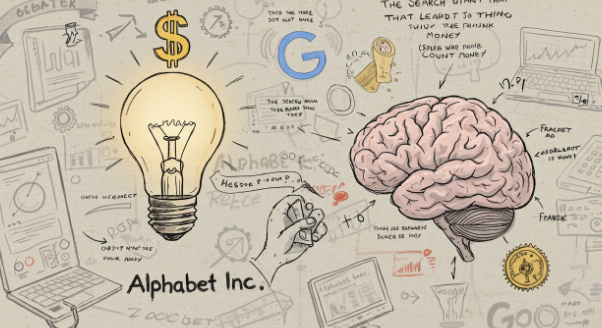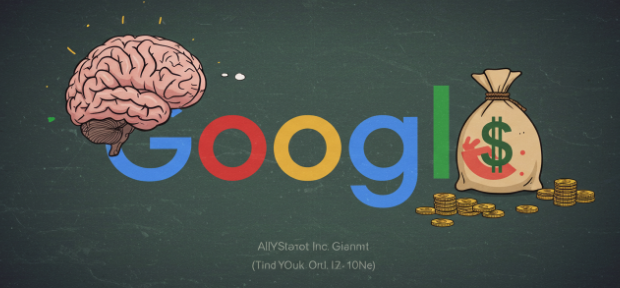Stock Symbol: GOOGL | Current Price: ~$175 (September 2025) | Target Price: $230+ | Timeframe: 12-18 months
Remember when Google just helped you find cat videos and settle dinner table arguments? Those days are adorably quaint. Today’s Alphabet has evolved into an AI powerhouse that processes 480 trillion tokens monthly while somehow making it look effortless. With AI Overviews reaching 1.5 billion users and Gemini 2.0 entering the “agentic era” (fancy talk for AI that actually gets stuff done), Google isn’t just organizing the world’s information anymore – it’s teaching machines to think about it too.
The Gemini Takeover: When AI Gets Serious

Google’s Gemini platform isn’t just another chatbot trying to sound smart at parties. Processing 480 trillion tokens monthly across Search, Gemini app, and Cloud APIs, it’s basically the overachiever of the AI world, handled entirely by Google’s custom Tensor Processing Units called “Ironwood.” Yes, they named their chips after trees, because apparently even Google’s hardware team has a sense of humor.
Gemini 2.0 represents Google’s entry into what they call the “agentic era,” which sounds like something from a sci-fi movie but essentially means AI that can actually complete complex tasks without needing constant hand-holding. Think of it as the difference between a helpful intern and someone who can actually run the project while you’re on vacation.
The real party trick? Gemini 1.5 Pro can process 1 million tokens of information simultaneously. That’s like reading a small library and remembering everything, which puts it well ahead of most humans after their morning coffee.
Search Gets a Brain Upgrade
AI Overviews have reached 1.5 billion monthly users, fundamentally changing how people interact with Google Search. Instead of just showing you links and hoping for the best, Google now provides actual answers, complete with the confidence of someone who’s actually read all the sources instead of just skimming the headlines.
The recent launch of AI Mode introduces experimental features for complex queries, which means Google is finally admitting that sometimes people ask really complicated questions and deserve better than “I’m feeling lucky.” The integration creates new monetization opportunities because, let’s face it, more engaged users equal more advertising revenue, and Google has never been shy about the money-making part.
Rather than rushing features to market like some competitors who shall remain nameless (but rhyme with “Shmicrosoft”), Google emphasizes accuracy and reliability. This measured approach reduces the risk of AI hallucinations, which is tech-speak for “making stuff up” – something the internet really doesn’t need more of.
Cloud Business: The Underdog That Could
Google Cloud continues growing despite occasionally missing analyst expectations, which in Google’s case is like getting an A- instead of an A+ and having everyone worry about your future. The platform signed the same number of billion-dollar deals in the first half of 2025 that it achieved in all of 2024, suggesting that enterprises are finally warming up to Google’s “we’re not just search anymore” pitch.
More than 85,000 enterprises now use Google Cloud, including fancy names like LVMH, Salesforce, and Singapore’s DBS Bank. The upcoming launch of Gemini models on Google Distributed Cloud, partnering with NVIDIA, addresses the “we want AI but we’re paranoid about data” crowd – a surprisingly large market segment.
Beyond Search: Google’s Side Hustles
Waymo, Google’s autonomous driving venture, now completes 250,000 weekly rides across four U.S. cities. That’s a lot of people trusting robots with their commute, which either shows remarkable faith in technology or a deep frustration with human drivers.
Google’s commitment of $150 million to AI education demonstrates the company’s long-term thinking: teach today’s students to use Google’s AI tools, and tomorrow’s workforce will demand them at every job. It’s like getting kids hooked on a particular brand of crayons, except the crayons are artificial intelligence and the coloring books are the entire economy.
The “Other Bets” segment continues losing money while pursuing moonshot projects, because apparently having infinite cash means you can afford to fund science fiction until it becomes science fact.
The Investment Pitch: Why Google Wins
Google’s comprehensive AI ecosystem creates competitive advantages that would make medieval castle builders jealous. The company’s access to data from billions of users provides AI training advantages that competitors can’t easily replicate, unless they want to start their own internet (spoiler alert: that’s harder than it sounds).
The integration of AI across Google’s product portfolio creates network effects where improvements in one area benefit everything else. It’s like having a really efficient household where fixing the kitchen somehow makes the living room better too.
Custom TPU development provides cost and performance advantages while reducing dependence on external chip suppliers. Google learned the valuable lesson that if you want something done right (and cheaply), sometimes you have to build it yourself.
The Reality Check: What Could Go Wrong
Regulatory scrutiny remains Google’s biggest headache, as governments worldwide continue asking uncomfortable questions about market dominance. Antitrust enforcement could limit AI integration across products, which would be like forcing a chef to cook each ingredient separately instead of making a complete meal.
Competition from well-funded AI startups keeps Google’s product teams busy, though the company’s strategy of building platforms rather than chasing every shiny new AI application shows admirable focus (and possibly exhaustion from trying to keep up with everything).
Price Target and Final Thoughts
Based on Google’s AI transformation, cloud growth acceleration, and expanding monetization opportunities, the company presents a compelling investment opportunity with a 12-18 month price target of $230+ per share. This reflects both fundamental growth and the market finally recognizing that Google isn’t just a search company anymore – it’s the infrastructure powering the AI revolution, with a side business in organizing human knowledge.
Key catalysts include continued AI integration, cloud business momentum, successful monetization of new AI capabilities, and maybe Waymo finally convincing everyone that robot drivers are better than the alternative. Google has successfully evolved from “don’t be evil” to “don’t be boring,” and the financial results suggest investors appreciate the transformation.
Disclaimer: This analysis contains traces of humor and should not be considered personalized investment advice. Past performance does not guarantee future results, though Google’s track record suggests they’re pretty good at this whole technology thing. Consult with a qualified financial advisor who hopefully has a better sense of humor than most financial advisors.
Last Updated: September 2025
Next Review: December 2025

Leave a Reply